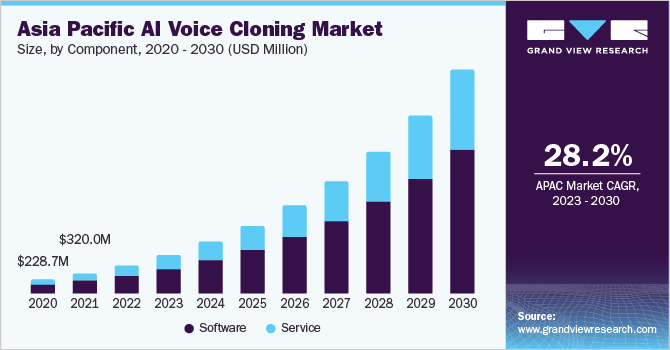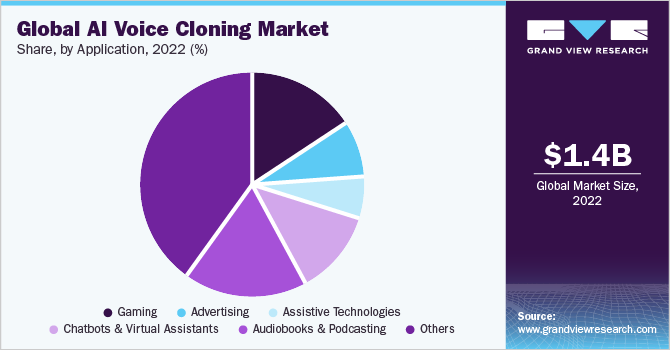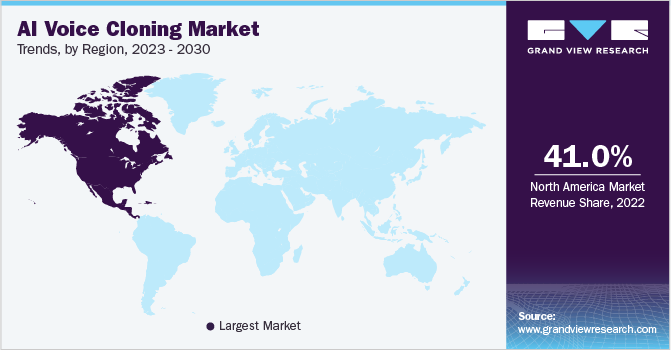
AI Voice Cloning Market Size, Share & Trends Analysis Report By Component (Software, Service), By Deployment (On-premises, Cloud), By Application (Gaming, Advertising), By Vertical, By Region, And Segment Forecasts, 2023 - 2030
- Report ID: GVR-4-68040-083-1
- Number of Pages: 100
- Format: Electronic (PDF)
- Historical Range: 2017 - 2021
- Industry:Technology
Report Overview
The globalAI voice cloning market sizewas valued atUSD 1.45 billion in 2022and is expected to grow at a compound annual growth rate (CAGR) of 26.1% from 2023 to 2030. The rapid advancements in AI technology, particularly in Machine Learning(ML) andNatural Language Processing(NLP), are driving the growth of the AI cloning market. These advancements enable the development of more sophisticatedAImodels that mimic human-like behaviors, speech patterns, and decision-making processes. In addition, AI cloning enables the creation of virtual customer service representatives to provide round-the-clock support, handle customer queries, and assist with everyday issues, to improve customer service efficiency, reduce costs, and enhance customer satisfaction, thereby driving the adoption of AI cloning technologies in the customer service industry.

Advancements in AI technology drive the market, the need for personalized user experiences, and enhanced customer service. The market trends includedeep learningand neural networks, NLP advancements, ethical considerations & regulation, and integration with AR &VR. As the market continues to evolve, it holds immense potential for transforming various industries and creating new opportunities for personalized, interactive experiences. Deep learning algorithms and neural networks are fundamental components of AI cloning as they enable the training and development of complex AI models that can mimic human-like behaviors, speech patterns, and decision-making processes.
These algorithms and networks are designed to learn and extract meaningful patterns and representations from large amounts of data. One prominent trend in AI cloning is generative models, particularly Generative Adversarial Networks (GANs). GANs consist of two neural networks: a generator and a discriminator. The generator network learns to create synthetic data, such as images, text, or audio, resembling real data samples. The discriminator network evaluates the authenticity of the generated data by comparing it to real data samples. This adversarial training process drives the generator to improve its output, generating more realistic and nuanced AI clones.
Integrating AI clones withARand VR in gaming creates new dimensions of player engagement and immersion. Players can interact with AI characters exhibiting realistic behaviors, gestures, and responses, enhancing the gaming experience. AI clones can serve as virtual opponents, teammates, or guides, providing more dynamic and personalized gameplay. AR and VR training simulations can be enhanced by incorporating AI clones that simulate real-world scenarios and interactions. For example, in industries, such as healthcare, AI clones can act as virtual patients, allowing medical professionals to practice diagnosing and treating various conditions in a realistic virtual environment. This integration facilitates safe and repetitive training, improving skills and decision-making.
Component Insights
The software segment held the highest revenue share of over 65% in 2022 and is anticipated to hold the maximum share throughout the forecast period. AI voice cloning solutions are advancing rapidly, driven by developments in deep learning, speech synthesis, and voice conversion techniques. The trends in this field revolve around improving voice quality, enabling personalization, supporting multilingualism and accented speech, and exploring real-time voice conversion capabilities. As technology evolves, AI voice cloning solutions are expected to play an increasingly significant role in various industries, including entertainment, communication, and human-computer interaction.
服务部分估计highest CAGR over the forecast period. AI voice cloning services are utilized in the voice-over industry to generate professional-quality voice recordings. Companies can use AI voice cloning technologies to create custom voice-overs for commercials, videos, e-learning content,audiobooks, and more. This service streamlines the voice-over production process and gives businesses access to a wide variety of voice options. AI voice cloning services are transforming the media and entertainment industry. These services allow content creators to generate voice-overs for characters, dubbing, and localization.
Deployment Insights
The On-premises segment led the market in 2022, accounting for over 61% share of the global revenue.Organizations considering their voice cloning models and algorithms as proprietary assets may opt for on-premises solutions to protect their intellectual property. By keeping the entire process in-house, they can maintain complete control over their voice cloning technology and prevent any potential leaks or unauthorized access. On-premises AI voice cloning solutions provide organizations greater flexibility to customize and fine-tune their voice cloning models according to specific requirements.The cloud segment is estimated to grow significantly over the forecast period.
Cloud-based AI voice cloning solutions provide scalable and flexible infrastructure to handle the computational requirements of voice cloning models. With the cloud, organizations can scale up or down their AI voice cloning capabilities based on demand, allowing them to efficiently handle large volumes of data and perform complex voice cloning tasks. Cloud-based AI voice cloning eliminates the need for extensive on-premises infrastructure and hardware investments. Organizations can leverage the pay-as-you-go model of cloud services, where they only pay for the resources they use. It makes AI voice cloning more accessible and cost-effective for small- and medium-sized businesses.
Application Insights
The audiobooks &podcastingsegment led the market in 2022 accounting for over 17% share of the global revenue. AI voice cloning enables the creation of high-quality synthetic voices that can narrate audiobooks. Publishers leverage this technology to produce audiobooks more efficiently and cost-effectively. It allows for a broader range of books to be converted into audio format, including those that may not have been feasible with human narrators alone. Advancements in AI voice cloning aim to make synthetic voices sound more natural, expressive, and human-like. The focus is on capturing nuances, emotions, and intonations to create a more engaging and authentic listening experience.
The assistive technology segment is estimated to grow at the highest CAGR over the forecast period. AI voice cloning can create personalized voices for individuals who cannot speak or have difficulty with verbal communication. Training the AI model on the person’s existing voice recordings or using a similar voice can generate a voice that closely resembles theirs, allowing them to express themselves more authentically. Researchers are working on real-time voice cloning techniques, allowing individuals immediate access to their personalized synthetic voice during live interactions, phone calls, or video conferences.
Vertical Insights
媒体和娱乐领域最大的举行revenue share of over 24% in 2022. Media & entertainment are leveraging AI voice cloning to create customized brand voices for customer interactions. Businesses can reach their target audiences more effectively by establishing a consistent voice identity across various touchpoints, such as customer support, virtual assistants, and Interactive Voice Response (IVR) systems.

Customized brand voices also enhance brand recognition and provide a cohesive user experience. The healthcare and life sciences segment is predicted to foresee significant growth in the forecast years. The healthcare industry is adopting AI voice cloning technology to improve patient care and automate administrative tasks. Professionals in these domains must dialogue with their clients, mainly because speaking elicits their trust. It is highly relevant, particularly for healthcare professionals and social workers who venture online.
Regional Insights
North America dominated the market in 2022, accounting for over 41% share of the global revenue. Virtual assistants andchatbotshave gained widespread popularity in North America, becoming integral components of business customer service strategies. AI voice cloning significantly enhances the capabilities of these virtual assistants and chatbots by providing them with more natural and human-like voices. This trend drives the demand for AI voice cloning solutions in North America as businesses seek to deliver personalized and interactive customer experiences.Asia Pacific is anticipated to register the highest CAGR from 2023 to 2030.

Asia Pacific is home to several leading technology companies and startups driving innovation in the AI sector. These companies invest in AI voice cloning research, development, and commercialization. Collaborations between tech companies, academic institutions, and industry players are fostering regional market growth. For instance, in September 2021, an AI-based voice automation company headquartered in Bengaluru, Skit, formerly Vernacular.ai, raised USD 23M for growth. ViVA, short for Vernacular Intelligent Voice Assistant, is the company’s AI-based platform for voice automation, which automates 90% of the processes in call centers.
Key Companies &Market Share Insights
Prominent companies in the market have embraced product launches and developments as their primary business strategy to bolster their market share. By continuously innovating and introducing new products, these companies aim to stay ahead of the competition and meet the evolving needs of their customers. For instance, in February 2023, Microsoft Corp. brought its AI-powered Bing to mobile devices and added a new voice chat function. The chatbot has been added to the iOS and Android mobile apps for Edge, Bing, and Skype as a preview release. The ChatGPT-powered Bing will be capable of conversing verbally.
Mergers and acquisitions are another avenue these companies pursue to strengthen their market position. Through strategic partnerships and acquisitions, they can gain access to complementary technologies, expand their product portfolios, and leverage the expertise of other companies to accelerate their growth. For instance, in April 2023, David Ciccarelli, the founder and Chief Executive Officer of Voices.com Inc., announced the acquisition of a website, Voices.ai. The acquisition recognizes that the industry is rapidly shifting towards cloned and AI-generated voices that complement natural voiceovers performed by professional voice actors. Some of the prominent players in the global AI voice cloning market include:
IBM Corp.
Google LLC
Nuance Communications
Microsoft Corp.
LumenVox
Descript
iSpeech
CandyVoice
Amazon.com, Inc.
Baidu
AI Voice Cloning Market Report Scope
Report Attribute |
Details |
Market size value in 2023 |
USD 1.92 billion |
Revenue forecast in 2030 |
USD 9.75 billion |
Growthrate |
CAGR of 26.1% from 2023 to 2030 |
Base year for estimation |
2022 |
Historical data |
2017 - 2021 |
Forecast period |
2023 - 2030 |
Quantitative units |
Revenue in USD million/billion, and CAGR from 2023 to 2030 |
Report coverage |
Revenue forecast, company ranking, competitive landscape, growth factors, and trends |
Segments covered |
Component, deployment, application,vertical, region |
Regional scope |
北美;欧洲;亚太地区;拉丁美洲; MEA |
Country scope |
U.S.; Canada; U.K.; Germany; France; China; Japan; India; South Korea; Australia, Brazil, Mexico, KSA; UAE; South Africa |
Key companies profiled |
IBM; Google LLC; Nuance Communications; Microsoft Corp.; LumenVox; Descript; iSpeech; CandyVoice; Amazon.com, Inc.; Baidu |
Customization scope |
Free report customization (equivalent up to 8 analysts working days) with purchase. Addition or alteration to country, regional & segment scope. |
Pricing and purchase options |
Avail customized purchase options to meet your exact research needs.Explore purchase options |
Global AI Voice Cloning Market Report Segmentation
This report forecasts revenue growth and provides an analysis of the latest trends in each of the sub-segments from 2017 to 2030. For this report, Grand View Research has segmented the global AI voice cloning market report based on component, deployment, application, vertical, and region:
Component Outlook (Revenue, USD Million, 2017 - 2030)
Software
Service
Deployment Outlook (Revenue, USD Million, 2017 - 2030)
On-premises
Cloud
Application Outlook (Revenue, USD Million, 2017 - 2030)
Gaming
Advertising
Assistive Technologies
Chatbots and Virtual Assistants
Audiobooks and Podcasting
Others
Vertical Outlook (Revenue, USD Million, 2017 - 2030)
Media & Entertainment
Healthcare and Life Sciences
Education and E-Learning
Others
Regional Outlook (Revenue, USD Million, 2017 - 2030)
North America
U.S.
Canada
Europe
U.K.
Germany
France
Asia Pacific
China
Japan
India
South Korea
Australia
拉丁美洲
Brazil
Mexico
Middle East and Africa (MEA)
Kingdom of Saudi Arabia (KSA)
UAE
South Africa
Frequently Asked Questions About This Report
b.The global AI voice cloning market size was estimated at USD 1.45 billion in 2022 and is expected to reach USD 1.92 billion in 2023.
b.The global AI voice cloning market is expected to grow at a compound annual growth rate of 26.1% from 2023 to 2030 to reach USD 9.75 billion by 2030.
b.North America dominated the AI voice cloning market with a share of 41.2% in 2022. This is attributable to the plenty of investments from venture capitalists and private-equity investors in the AI sector in the U.S.
b.Some key players operating in the AI voice cloning market include IBM Corporation; Google LLC; Nuance Communications; Microsoft Corporation; LumenVox; Descript; iSpeech; CandyVoice; Amazon.com, Inc., Baidu
b.Key factors driving the AI voice cloning market growth include penetration of technologies such as deep learning and neural networks, NLP advancements, ethical considerations and regulation, and integration with AR and VR.





